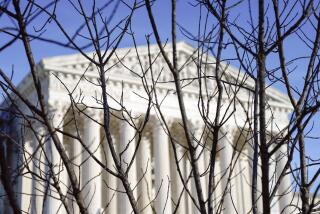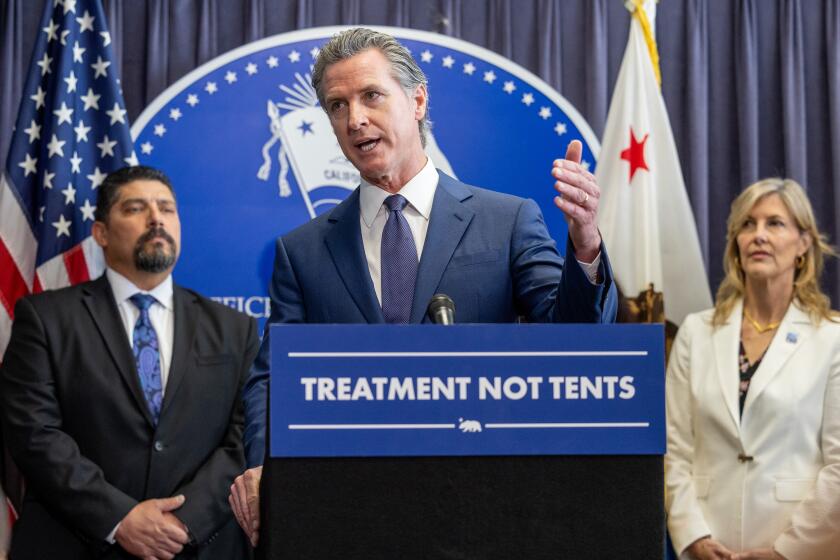As Trump retreats on census, outlines of next battle come into focus
President Trump’s decision to give up his fight to put a question about citizenship on the 2020 census had all the hallmarks of the way he routinely handles retreats:
He denied he was giving up, even as he did so. He attacked his opponents, accusing them of a lack of patriotism. And he publicly blamed others — judges, this time — for the failure.
Perhaps most characteristically, he set the stage for another battle to come, in this case a fight over congressional district lines that is likely to play out in several Republican-controlled states after the next election.
Sign up for the Essential Politics newsletter »
AIMING FOR AN UNDERCOUNT
As Chief Justice John G. Roberts Jr. made clear in his opinion that blocked Trump from adding the citizenship question to the census, this was a case the administration had to work hard to lose.
The court’s 5-4 ruling allowed that the administration had “broad authority” over how to conduct the census and what questions to ask. The secretary of Commerce, who oversees the Census Bureau, has the authority to “make policy choices” about how to conduct the every-10-year count of the population, even if the government’s technical experts disagree with him, Roberts said.
The one thing that Commerce Secretary Wilbur Ross didn’t have the right to do, however, was make up a phony reason for his decision and try to palm that off on the courts as the true rationale, Roberts wrote. But that, the chief justice politely but clearly concluded, was exactly what Ross and other administration officials tried to do.
The law requires government agencies to offer “genuine justifications for important decisions, reasons that can be scrutinized by courts and the interested public. Accepting contrived reasons would defeat the purpose of the enterprise,” Roberts wrote.
Trump’s action on Thursday, however, made clear why Ross resorted to a pretext: As Noah Bierman and I wrote, Trump covered his retreat by issuing an executive order that told government agencies to do something they already mostly do — share information with the Census Bureau to allow it to accurately estimate how many noncitizens live in any particular place.
Census Bureau officials said more than a year ago that they could do that by matching the census count with Social Security, IRS and immigration records. That approach would give the government the information it wanted without hurting the accuracy of the census by discouraging people from responding, they said.
There’s the rub. What the Census Bureau regarded as a bug — a flawed population count — many in the administration seemed to see as a feature.
The evidence suggests that administration officials actively wanted to provoke large numbers of immigrants to refuse to respond to the census, causing an undercount of the population in places like California that have big immigrant populations. Since the census is used to allocate federal money and congressional seats, an undercount could significantly damage immigrant-heavy states, many of which are Democratic strongholds.
State officials and activists worry now that the damage already may have been done. Even though Trump ultimately lost, the publicity around adding a citizenship question, combined with the fear of stepped-up immigration raids, could lead to the undercount that his administration may have sought all along.
NEXT BIG FIGHT
In setting out his reasons why the government needs to know how many noncitizens live where, Trump fired the first shot in what could be a huge political fight in some states two years from now.
The data about citizenship is “relevant to administering our elections,” he said. “Some states may want to draw state and local legislative districts based upon the voter-eligible population.”
Currently, all states draw district lines based on an area’s total population — young, old, citizen, noncitizen. That’s the standard set out in the Constitution for allocating congressional seats to each state: “counting the whole number of persons.”
The Supreme Court has never ruled on whether that’s mandatory, though, or whether states could use voter-eligible population to decide how to draw district lines. Doing so would shift political power away from areas with large numbers of noncitizens — or large numbers of people younger than 18. In most parts of the country, that would mean reducing the political power of big cities in favor of older, whiter, more Republican areas.
States where Democrats have the majority aren’t likely to go in that direction. But the issue has come up in several Republican-majority states. Texas, where Houston, Dallas, Austin and San Antonio provide the base for Democratic efforts to try to regain a majority statewide, could be a prime battleground.
If Trump wins reelection in 2020, look for him to side with Republicans in that state, and perhaps elsewhere, as they seek to change the rules to keep power firmly in their hands.
ANOTHER CABINET OFFICIAL GONE
Labor Secretary R. Alexander Acosta announced Friday morning that he was stepping down from his post.
As Caroline Engelmayer wrote, Acosta’s problem was a lenient plea deal he negotiated with Jeffrey Epstein when Acosta was the U.S. attorney in Miami during the George W. Bush administration.
The plea deal allowed Epstein, the wealthy money manager, to avoid federal prosecution on sex trafficking charges. Now that he’s facing similar charges in New York, attention has focused on the earlier case.
Acosta’s departure is the latest case in which the Trump administration ran into trouble from failing to adequately vet a nominee before Trump named him.
A DIFFERENT LOOK AT THE BORDER
The southern border is a complex place. How complex? How about refugees from Cameroon and Congo crowded into a Mexican border camp seeking asylum in the U.S.?
The story by Molly O’Toole, with vivid photographs by Carolyn Cole, describes a whole other dimension of the problems at the border and explains how a key Trump administration policy, known as metering, has provided a powerful incentive for asylum seekers to cross the Rio Grande illegally.
If you haven’t already read it, do yourself a favor and set aside time to do so.
TRUMP’S REELECTION HOPE: MORE OF THE SAME
Some incumbent presidents feel a need to lay out a new theme for their reelection bid — remember Bill Clinton’s “bridge to the 21st century”?
Trump, who has never claimed to be a big policy wonk, thinks he’s better off sticking with what worked last time, Bierman writes. Expect a reelection campaign that will largely reprise the slogans of 2016.
DROPPING IN, DROPPING OUT
The overly large Democratic field of candidates had its first exit this week, as California Rep. Eric Swalwell of Dublin quit the race.
But just as he did so, another Californian, billionaire activist Tom Steyer, joined the swarm, Evan Halper wrote.
Steyer’s money gives him an asset his rivals can’t match — he told Halper he’d spend $100 million on his race. But it also brings liabilities, as Michael Finnegan and Seema Mehta wrote. His investments in private prisons and coal mining at his hedge fund could easily become fodder for campaign attacks.
Steyer’s first big hurdle: qualifying for the September candidate debate.
Right now, that September matchup is shaping up to have a small list of candidates. A new NBC/Wall Street Journal poll released Thursday showed only seven candidates hitting 2% support, which is the threshold for qualifying: Joe Biden, Sens. Elizabeth Warren, Kamala Harris and Bernie Sanders, Mayor Pete Buttigieg, Beto O’Rourke and Andrew Yang.
The list won’t be final until the end of August, so plenty of time remains for more polls, but almost surely, as I wrote last week, a lot of candidates won’t make the cut.
WARREN’S ADVANTAGE
Warren out-raised both Harris and Sanders in second-quarter fundraising, Janet Hook wrote. That was a notable shift from the first three months of the year, in which her money raising was lackluster.
Meantime, as Hook also wrote, Buttigieg’s campaign has generated tremendous pride among many gay voters. He and his husband, Chasten, have become the best known gay male couple in America. But even many of his admirers question whether he can win.
AND BIDEN’S RECORD
Biden earned $15 million since leaving office as Barack Obama’s vice president, tax returns released by his campaign show.
Biden sought to put a spotlight this week on an area in which he has an advantage over his rivals, with a foreign policy speech that promised to restore the pre-Trump world order, Halper wrote.
He’s been much less willing to talk about his more distant past on racial issues. It’s a complex picture, as Halper wrote. Biden long has supported civil rights. Years ago as a young senator from Delaware, however, he made choices that haunt his White House bid today
The debate over Biden’s position on school busing has refocused attention on a major U.S. problem: Segregation has worsened in the nation’s schools as federal officials largely dropped the issue, Mehta and Finnegan wrote.
HEALTHCARE ISSUE ROILING BOTH PARTIES
Mark Barabak and Noam Levey examined Democratic proposals to provide healthcare to undocumented immigrants, an idea that could backfire in a general election, they noted.
Levey also listened in as a federal appeals court in New Orleans heard the latest legal challenge to Obamacare. The appeals court judges appeared skeptical about the law, suggesting that they might strike down at least part of it.
A ruling against the law would set up a Supreme Court test in the middle of the election year, something that Republican strategists would prefer to avoid.
Administration officials, meanwhile, have made contradictory arguments in court, telling judges in some cases that Obamacare is failing and saying in others that it’s thriving, Levey points out.
AN UNPREDICTABLE JUSTICE
In a depressingly large share of instances, how judges will rule in high-profile cases can be predicted simply by knowing which party was in control when they were nominated.
Supreme Court Justice Neil M. Gorsuch is a notable and unpredictable exception, at least in cases involving criminal law, David Savage wrote. Gorsuch’s libertarian approach allies him with fellow conservatives on most issues, but with liberals on some weighty criminal cases.
ENVIRONMENTAL CLAIMS SCRUTINIZED
Trump gave a speech on the environment this week. Most of his claims don’t stand up, Anna Phillips wrote.
WHO YOU CALLING INSECURE?
A London tabloid published private memos that the British ambassador to Washington, Kim Darroch, wrote to his superiors back in London. Among other things, he called Trump “insecure.”
Trump promptly proved the point by publicly saying he would “no longer deal” with the ambassador, who has now resigned.
The incident put a chill on candid diplomacy, Tracy Wilkinson wrote.
LOGISTICS
That wraps up this week. Until next time, keep track of all the developments in national politics and the Trump administration at our Politics page and on Twitter @latimespolitics.
Send your comments, suggestions and news tips to politics@latimes.com.
If you like this newsletter, tell your friends to sign up.
More to Read
Get the L.A. Times Politics newsletter
Deeply reported insights into legislation, politics and policy from Sacramento, Washington and beyond. In your inbox three times per week.
You may occasionally receive promotional content from the Los Angeles Times.







